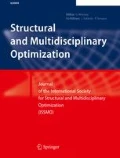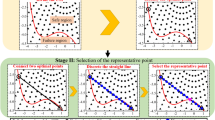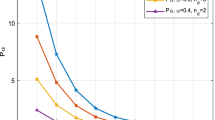Abstract
The Kriging-based reliability analysis is extensively adopted in engineering structural reliability analysis for its capacity to achieve accurate failure probability estimation with high efficiency. Generally, the Kriging-based reliability analysis is an active-learning process that mainly includes three aspects: (1) the determination of the design space; (2) the rule of choosing new samples, i.e., the learning function; and (3) the stopping criterion of the active-learning process. In this work, a new learning function and an error-based stopping criterion are proposed to enhance the efficiency of the active-learning Kriging-based reliability analysis. First, the reliability-based lower confidence bounding (RLCB) function is proposed to select the update points, which can balance the exploration and exploitation through the probability density-based weight. Second, an improved stopping criterion based on the relative error estimation of the failure probability is developed to avoid the pre-mature and late-mature of the active-learning Kriging-based reliability analysis method. Specifically, the samples that have large probabilities to change their safety statuses are identified. The estimated relative error caused by these samples is derived as the stopping criterion. To verify the performance of the proposed RLCB function and the error-based stopping criterion, four examples with different complexities are tested. Results show that the RLCB function is competitive compared with state-of-the-art learning functions, especially for highly non-linear problems. Meanwhile, the new stopping criterion reduces the computational resource of the active-learning process compared with the state-of-the-art stopping criteria.

















Similar content being viewed by others
Abbreviations
- PDF:
-
Probability density function
- CDF :
-
Cumulative density function
- LSF:
-
Limit state function
- LS:
-
Limit state
- KRA:
-
Kriging-based reliability analysis
- ALKRA:
-
Active-learning Kriging-based reliability analysis
- ESC:
-
Error-based stopping criterion
- LCB:
-
Low confidence bounding function
- RLCB:
-
Reliability-based low confidence bounding function
- BSC:
-
Error-based stopping criterion using bootstrap confidence estimation
- Cov :
-
Coefficient of variation
References
Au S-K, Beck JL (2001) Estimation of small failure probabilities in high dimensions by subset simulation. Probab Eng Eng Mech 16:263–277. https://doi.org/10.1016/S0266-8920(01)00019-4
Au SK, Beck JL (2003) Important sampling in high dimensions. Struct Saf 25:139–163. https://doi.org/10.1016/S0167-4730(02)00047-4
Bichon BJ, Eldred MS, Swiler LP, Mahadevan S, McFarland JM (2008) Efficient global reliability analysis for nonlinear implicit performance functions. AIAA J 46:2459–2468. https://doi.org/10.2514/1.34321
Box GE, Cox DR (1964) An analysis of transformations. J R Stat Soc Ser B Methodol 26:211–243
Cai S, Zhang P, Dai W, Cheng Y, Liu J (2019) Multi-objective optimization for designing metallic corrugated core sandwich panels under air blast loading. J Sandw Struct Mater. https://doi.org/10.1177/1099636219855322
Cardoso JB, de Almeida JR, Dias JM, Coelho PG (2008) Structural reliability analysis using Monte Carlo simulation and neural networks. Adv Eng Softw 39:505–513. https://doi.org/10.1016/j.advengsoft.2007.03.015
Cérou F, Del Moral P, Furon T, Guyader A (2011) Sequential Monte Carlo for rare event estimation. Stat Comput 22:795–808. https://doi.org/10.1007/s11222-011-9231-6
Cheng J, Jiang P, Zhou Q, Hu J, Yu T, Shu L, Shao X (2019) A lower confidence bounding approach based on the coefficient of variation for expensive global design optimization. Eng Comput 36:1–21. https://doi.org/10.1108/ec-08-2018-0390
Cox DD, John SA (1992) Statistical method for global optimization. In: 1992 IEEE International Conference on Systems, Man, and Cybernetics, 18–21 Oct. 1992, vol 1242, pp 1241–1246. https://doi.org/10.1109/ICSMC.1992.271617
Deb K (2000) An efficient constraint handling method for genetic algorithms. Comput Methods Appl Mech Eng 186:311–338
DiCiccio TJ, Efron B (1996) Bootstrap confidence intervals. Stat Sci 11:189–212
Du X, Hu Z (2012) First order reliability method with truncated random variables. J Mech Des 134:091005 (091009 pp.). https://doi.org/10.1115/1.4007150
Echard B, Gayton N, Lemaire M (2011) AK-MCS: an active learning reliability method combining Kriging and Monte Carlo Simulation. Struct Saf 33:145–154. https://doi.org/10.1016/j.strusafe.2011.01.002
Efron B, Tibshirani RJ (1994) An introduction to the bootstrap. CRC press, Boca Raton
Forrester AIJ, Sóbester A, Keane AJ (2008) Engineering design via surrogate modelling a practical guide. Wiley, Hoboken
Gutmann HM (2001) A radial basis function method for global optimization. J Glob Optim 19:201–227. https://doi.org/10.1023/A:1011255519438
Hristov PO, DiazDelaO FA, Farooq U, Kubiak KJ (2019) Adaptive Gaussian process emulators for efficient reliability analysis. Appl Math Model 71:138–151. https://doi.org/10.1016/j.apm.2019.02.014
Hu Z, Du X (2015) First order reliability method for time-variant problems using series expansions. Struct Multidiscip Optim 51:1–21. https://doi.org/10.1007/s00158-014-1132-9
Jiang P, Zhang Y, Zhou Q, Shao X, Hu J, Shu L (2017) An adaptive sampling strategy for Kriging metamodel based on Delaunay triangulation and TOPSIS. Appl Intell 48:1644–1656. https://doi.org/10.1007/s10489-017-1031-z
Jiang C, Qiu H, Yang Z, Chen L, Gao L, Li P (2019) A general failure-pursuing sampling framework for surrogate-based reliability analysis. Reliab Eng Syst Saf 183:47–59. https://doi.org/10.1016/j.ress.2018.11.002
Jiang C, Qiu H, Gao L, Wang D, Yang Z, Chen L (2020) Real-time estimation error-guided active learning Kriging method for time-dependent reliability analysis. Appl Math Model 77:82–98. https://doi.org/10.1016/j.apm.2019.06.035
Jones D, Schonlau M, Welch W (1998) Efficient global optimization of expensive black-box functions. J Glob Optim 13:455–492
Kiureghian AD, Liu PL (1986) Structural reliability under incomplete probability information. J Eng Mech 112:85–104. https://doi.org/10.1061/(ASCE)0733-9399(1986)112:1(85)
Kleijnen JPC (2009) Kriging metamodeling in simulation: a review. Eur J Oper Res 192:707–716. https://doi.org/10.1016/j.ejor.2007.10.013
Krige DG (1951) A statistical approach to some basic mine valuation problems on the witwatersrand. J Chem Metallurg Min Soc South Africa 52:119–139
Li X, Gong C, Gu L, Gao W, Jing Z, Su H (2018) A sequential surrogate method for reliability analysis based on radial basis function. Struct Saf 73:42–53. https://doi.org/10.1016/j.strusafe.2018.02.005
Ling C, Lu Z, Feng K, Zhang X (2019) A coupled subset simulation and active learning kriging reliability analysis method for rare failure events. Struct Multidiscip Optim 60:2325. https://doi.org/10.1007/s00158-019-02326-3
Lophaven SN, Nielsen HB, Søndergaard J (2002) DACE: a Matlab kriging toolbox vol 2. Citeseer,
Lv Z, Lu Z, Wang P (2015) A new learning function for Kriging and its applications to solve reliability problems in engineering. Comput Math Appl 70:1182–1197. https://doi.org/10.1016/j.camwa.2015.07.004
Peherstorfer B, Willcox K, Gunzburger M (2016) Optimal model management for multi-fidelity Monte Carlo estimation. SIAM J Sci Comput 38:A3163–A3194. https://doi.org/10.1137/15m1046472
Pradlwarter HJ, Schueller GI, Koutsourelakis PS, Charmpis DC (2007) Application of line sampling simulation method to reliability benchmark problems. Struct Saf 29:208–221. https://doi.org/10.1016/j.strusafe.2006.07.009
Qian J, Yi J, Cheng Y, Liu J, Zhou Q (2019) A sequential constraints updating approach for Kriging surrogate model-assisted engineering optimization design problem. Engineering with Computers:1–17. https://doi.org/10.1007/s00366-019-00745-w
Sacks J, Welch WJ, Mitchell TJ, Wynn HP (1989) Design and analysis of computer experiments. Stat Sci 4:409–423
Sadoughi MK, Hu C, CA MK, Eshghi AT, Lee S (2018) Sequential exploration-exploitation with dynamic trade-off for efficient reliability analysis of complex engineered systems. Struct Multidiscip Optim 57:235–250. https://doi.org/10.1007/s00158-017-1748-7
Schutte JF, Reinbolt JA, Fregly BJ, Haftka RT, George AD (2004) Parallel global optimization with the particle swarm algorithm. Int J Numer Methods Eng 61:2296–2315. https://doi.org/10.1002/nme.1149
Song S, Lu Z, Qiao H (2009) Subset simulation for structural reliability sensitivity analysis. Reliab Eng Syst Saf 94:658–665. https://doi.org/10.1016/j.ress.2008.07.006
Stein M (1987) Large sample properties of simulations using Latin hypercube sampling. Technometrics 29:143–151
Tamimi S, Amadei B, Frangopol DM (1989) Monte Carlo simulation of rock slope reliability. Comput Struct 33:1495–1505. https://doi.org/10.1016/0045-7949(89)90489-6
Verma AK, Ajit S, Karanki DR (2015) Reliability and safety engineering: second edition. In: Reliability and Safety Engineering: Second Edition. Springer-Verlag London Ltd. https://doi.org/10.1007/978-1-4471-6269-8
Wang Z, Shafieezadeh A (2019a) ESC: an efficient error-based stopping criterion for kriging-based reliability analysis methods. Struct Multidiscip Optim 59:1621–1637. https://doi.org/10.1007/s00158-018-2150-9
Wang Z, Shafieezadeh A (2019b) REAK: reliability analysis through error rate-based adaptive Kriging. Reliab Eng Syst Saf 182:33–45. https://doi.org/10.1016/j.ress.2018.10.004
Wen Z, Pei H, Liu H, Yue Z (2016) A sequential Kriging reliability analysis method with characteristics of adaptive sampling regions and parallelizability. Reliab Eng Syst Saf 153:170–179. https://doi.org/10.1016/j.ress.2016.05.002
Xiao N, Zuo M, Guo W (2018) Efficient reliability analysis based on adaptive sequential sampling design and cross-validation. Appl Math Model 58:404–420. https://doi.org/10.1016/j.apm.2018.02.012
Yang X, Liu Y, Mi C, Wang X (2018) Active learning Kriging model combining with kernel-density-estimation-based importance sampling method for the estimation of low failure probability. J Mech Des:140. https://doi.org/10.1115/1.4039339
Yang X, Mi C, Deng D, Liu Y (2019) A system reliability analysis method combining active learning Kriging model with adaptive size of candidate points. Struct Multidiscip Optim 60:137–150. https://doi.org/10.1007/s00158-019-02205-x
Yun WY, Lu ZZ, Jiang X (2018) An efficient reliability analysis method combining adaptive Kriging and modified importance sampling for small failure probability. Struct Multidiscip Optim 58:1383–1393. https://doi.org/10.1007/s00158-018-1975-6
Yun W, Lu Z, Jiang X, Zhang L, He P (2020) AK-ARBIS: an improved AK-MCS based on the adaptive radial-based importance sampling for small failure probability. Struct Saf 82:101891. https://doi.org/10.1016/j.strusafe.2019.101891
Zhang J, Du X (2010) A second-order reliability method with first-order efficiency. J Mech Des 132:101006 (101008 pp.). https://doi.org/10.1115/1.4002459
Zhang L, Lu Z, Wang P (2015) Efficient structural reliability analysis method based on advanced Kriging model. Appl Math Model 39:781–793. https://doi.org/10.1016/j.apm.2014.07.008
Zhang J, Xiao M, Gao L (2019a) An active learning reliability method combining Kriging constructed with exploration and exploitation of failure region and subset simulation. Reliab Eng Syst Saf 188:90–102. https://doi.org/10.1016/j.ress.2019.03.002
Zhang X, Wang L, Sørensen JD (2019b) REIF: a novel active-learning function toward adaptive Kriging surrogate models for structural reliability analysis. Reliab Eng Syst Saf 185:440–454. https://doi.org/10.1016/j.ress.2019.01.014
Zheng P, Chien M, Zong Z, Wang L (2017) A new active learning method based on the learning function U of the AK-MCS reliability analysis method. Eng Struct 148:185–194. https://doi.org/10.1016/j.engstruct.2017.06.038
Zhou C, Xiao N, Chen M (2018) AK-P: an active learning method combing Kriging and probability density function for reliability analysis. Paper presented at the DEStech Transactions on Computer Science Engineering,
Zhou Q, Wu J, Xue T, Jin P (2019) A two-stage adaptive multi-fidelity surrogate model-assisted multi-objective genetic algorithm for computationally expensive problems. https://doi.org/10.1007/s00366-019-00844-8
Funding
This research has been supported by the National Natural Science Foundation of China (NSFC) under Grant No. 51805179, the National Defense Innovation Program under Grant No. 18-163-00-TS-004-033-01, and the Research Funds of the Maritime Defense Technologies Innovation.
Author information
Authors and Affiliations
Corresponding author
Ethics declarations
Conflict of interest
The authors declare that they have no conflict of interest.
Replication of results
The replication of the results can be found through the web links: https://pan.baidu.com/s/122z3UzCS6anIH9vZSA17kQ, Password: kha4, or contacting with the authors through Email.
Additional information
Responsible Editor: Palaniappan Ramu
Publisher’s note
Springer Nature remains neutral withregard to jurisdictional claims in published mapsand institutional affiliations.
Rights and permissions
About this article
Cite this article
Yi, J., Zhou, Q., Cheng, Y. et al. Efficient adaptive Kriging-based reliability analysis combining new learning function and error-based stopping criterion. Struct Multidisc Optim 62, 2517–2536 (2020). https://doi.org/10.1007/s00158-020-02622-3
Received:
Revised:
Accepted:
Published:
Issue Date:
DOI: https://doi.org/10.1007/s00158-020-02622-3




